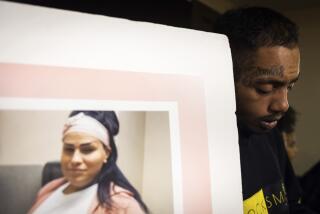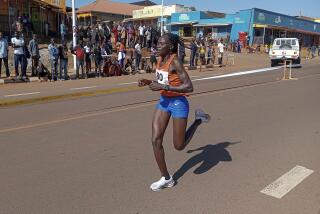Prosecutor wraps up grueling cross-examination of Oscar Pistorius
JOHANNESBURG, South Africa – Hours before South African Olympian Oscar Pistorius fatally shot his girlfriend, Reeva Steenkamp, she wrote him a Valentine’s Day card with the words, “I think today is a good day to tell you that I love you,” a court heard Tuesday.
The envelope was addressed to “Ozzie” with hearts and a squiggle on it, and the card’s message was accompanied by a smiley face, hearts and kisses.
A photograph of the card was released by the athlete’s legal team Tuesday, after Pistorius finished nearly seven days in the witness box, including five days of grueling cross-examination.
Pistorius told the Pretoria high court that the card was from “the day the accident happened.” He opened it months later.
The introduction of the card appeared to be an effort to undermine the prosecution’s contention that the couple had argued on the night of the killing and that Steenkamp sometimes feared the athlete.
Pistorius, who admits firing four bullets into a toilet cubicle in which Steenkamp had locked herself, has pleaded not guilty to her murder. He contends that he fired unconsciously, in terror, believing that an intruder was concealed in the toilet and was coming out to attack him.
Pistorius described Tuesday how he found Steenkamp slumped over the toilet, after breaking down the door with a cricket bat minutes after shooting her. Her head was on her shoulder, and her right arm on the toilet bowl.
He said he was “broken” and “overcome with sadness.”
Legal experts said Pistorius’ performance under cross-examination may have weakened his case, but noted that his defense team still has the bulk of its evidence to present, with up to 16 witnesses to be called.
Analysts have said that by insisting he did not intend to kill Steenkamp and acted unconsciously, Pistorius may have compromised his ability to claim that he acted in self defense, as it would require intent to fire at an imagined intruder.
“You can’t have it both ways,” advocate David Dadic said in an interview with South African television. “You either shot in self defense. That’s an intent. The other way is you did something involuntarily. He got very confused in terms of what wording he was using.”
Legal experts expressed surprise Tuesday that Pistorius’ advocate, Barry Roux, spent just eight minutes re-examining his client, given what they saw as a need to clear up questions about what Pistorius’ defense in fact was.
Under South African law, Pistorius was not allowed to communicate with his advocate while being cross-examined by the prosecution.
Dadic tweeted Tuesday that Pistorius was in “dire” straits after his turn in the witness box.
In the interview, he said he was “stunned” by Roux’s brief re-examination of his client, adding that when a witness struggles in the witness box, an advocate has a duty to “sort things out.”
“Possibly he thought there’s just too much to work with here, or possibly he thought that Oscar would make things worse,” Dadic said.
Roux also was limited by a rule that did not permit him to introduce new evidence during re-examination.
South African legal experts noted that Pistorius could be convicted of murder even if he didn’t intend to kill Steenkamp. Under the legal concept of dolus eventualis, a defendant who foresees that his actions can kill a person -- even if it is not the person actually killed -- can be convicted of murder. Actions such as firing bullets into a confined space could be relevant to such an argument.
Pistorius insisted that he never intended to shoot and did not do so consciously. In court Tuesday, he said he had felt “complete terror and a feeling of helplessness.”
Prosecutor Gerrie Nel did not accept that argument.
“You killed Reeva, and you’re the only person who can tell us what happened,” Nel said as he wrapped up his cross-examination. “I’m putting to you that your version is not only untruthful, but it’s so improbable that it cannot reasonably be possibly true.”
Nel said that a neighbor who testified earlier had heard an argument two hours before Pistorius shot Steenkamp. Pistorius denied that an argument had taken place.
Nel countered that four other neighbors heard Steenkamp’s bloodcurdling screams, not those of Pistorius, and said, “They heard that when she escaped from you. That’s why she screamed like that.”
“You shot four shots through the door, whilst knowing that she was standing behind the door. She locked herself into the toilet. You armed yourself with the sole purpose of shooting and killing her, and that’s what you did,” he said.
“That’s not true,” Pistorius said.
“Afterwards you were overcome by what you’d done. That is true,” Nel said. Pistorius agreed.
After Pistorius stepped down from the witness box, the defense called forensic geologist Roger Dixon, who conducted a sound test by hitting a door with a cricket bat. The test was played to the court to show that the sound was similar to a gun shot.
The defense contends that neighbors who testified that they heard a woman’s screams and gun shots actually heard Pistorius screaming before he smashed down the toilet door with a cricket bat.
Dixon also said a footprint had been left on the door, over a bullet hole -- apparently by police. He said this was “highly unprofessional” and compromised any evidence related to the bullet hole.
Twitter: @latimesdixon
More to Read
Sign up for Essential California
The most important California stories and recommendations in your inbox every morning.
You may occasionally receive promotional content from the Los Angeles Times.









